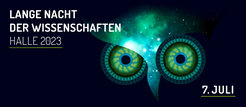AI in Psychotherapy, “Clan Crime”, Astronomy in Africa: Three Lectures during Science Night in Halle
How is artificial intelligence changing psychotherapy and what does it mean for patient-therapist relationship? Why are terms like “clan crime” and “parallel justice” not merely problematic, but also basically wrong? And what is so remarkable about the astronomical research being conducted in Africa? Three MPI researchers – Claudia Lang, Hatem Elliesie, and Hanna Nieber – will shed light on these questions during Science Night in Halle on Friday, 7 July in the Melanchthonianum. The lectures, which will be held in German, start at 17:00.

Claudia Lang: KI und die Zukunft der Psychotherapie
17:00–18:00, Melanchthonianum am Uniplatz, lecture hall D
The possibilities and threats of artificial intelligence (AI) have become a subject of ever-increasing debate. One of its more recent applications is in talk therapy – a realm that until now has been exclusively the domain of human psychotherapists. While some see therapy apps as an affordable, accessible, and non-stigmatizing option for the mental health care of the future, others are sceptical. They criticize the techologization of the therapeutic encounter, the lack of standards, and inadequate data protection. What ideas about health, empathy, and therapy have been programmed into therapy chatbots? How does this change the therapeutic relationship? What are the possibilities and limitations of AI therapy? The lecture offers an in-depth examination of these questions, drawing on field research concerning the development and use of AI-assisted therapy in India. Going beyond the issue of mental health and digitization, it also sheds light on the practice of anthropological research and why it matters.
Hatem Elliesie: “Paralleljustiz” und “Clankriminalität” – ein wissenschaftlicher Blick auf eine öffentliche Debatte
18:00–19:00 Melanchthonianum am Uniplatz, lecture hall D
In recent years, the term “parallel justice” has become an increasingly common buzzword in media reports and thereby also in the sociopolitical debates taking place in Germany. Other terms frequently heard in this context are “clans” and “clan crime” – almost invariably followed by reports about police interventions. But where did these terms come from and why are they problematic? Using examples from field research in the milieus referred to in such discussions, this interactive lecture will challenge the audience to revisit their perspectives. In addition, the lecture will offer insights into how field research is carried out, why these loaded terms are more than just words, and how empirical social research can provide valuable contributions to sociopolitical debates.
Hanna Nieber: Astronomie in Afrika – Vom Weltall und von wissenschaftlicher Forschung auf der Erde
19:00–20:00, Melanchthonianum am Uniplatz, lecture hall D
The heavens and its movements have long been the subject of interest for people around the world. Whether to determine the times and seasons for agriculture or for navigating the oceans: the stars help us to carry out our lives on Earth. With the help of science, our knowledge about heavenly bodies continues to grow – how they come to be, how they move, and how they decay. While much of the astronomy news focuses on programmes developed in the Global North, it is an important topic of research in Africa as well. What distinguishes astronomy in Africa from other parts of the world? How does the particularity of a place interact with science’s claims to universality? Based on anthropological research in Madagascar and South Africa, this lecture explores the social effects of astronomy research and its terrestrial infrastructure.
